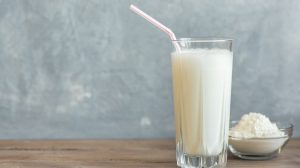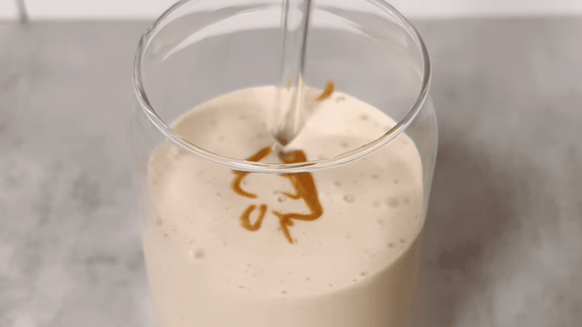The 11 Best Whey Protein Alternatives

Many gym goers, weightlifters and athletes, think whey supplementation is the only way forward when it comes to protein. But as the protein kings ourselves, we’re here to say that’s not the case.
Whey protein is just one option, which derives from milk, along with casein. Whey is created in the production of cheese, from the liquid whey that remains when curds come together. When whey protein is made, the whey liquid is processed and refined to separate the proteins from the fats and lactose, and then dried to produce a powder. Whey protein contains all nine essential amino acids, making it a great and very popular go-to for protein supplementation. But there are other complete protein sources out there well worth considering.
Jump to:
Vegan/vegetarian Lactose-free Organic Hemp - Pea
Brown rice Soy Egg white - Casein
- Collagen
- Beef
- Protein powder alternatives
- FAQs
Want the low-down on whey protein first? Nutritionist Richie has all the info here...
1. Vegan & Vegetarian Protein Powder
First up is the Vegan Protein Blend, a blend that contains protein derived from plant-based sources. Myprotein’s tri-blend of pea protein, brown rice protein and hemp protein combines these top sources of BCAAs (the building blocks of protein, which add to the structure of your new muscle tissues), creating a complete amino acid profile.
Along with these essential amino acids, this plant-powered product packs a whopping 22g of protein.
2. Lactose-free Protein Powder
One of the most common concerns for gainers trying to get their daily recommendation of protein is lactose. As the mighty whey derives from milk and cheese, lactose intolerant folk and those of us simply wishing to avoid lactose-containing products in our diets need to look for an alternative.
The answer is to seek out plant or egg-based proteins including brown rice, hemp and pea protein powders. The good news is that you’ll be pleasantly surprised to learn the protein per serving content rivals that of whey, so take a look at our vegan and vegetarian protein powders,
3. Organic Protein Powder
Have you gone organic? Organic protein powders are the way forward for anyone looking to avoid artificial ingredients, soy or sweeteners. Our Organic Whey Protein is created in strictly controlled, certified organic dairies in which cows are able to live as naturally as possible.
4. Hemp Protein Powder
Hemp is considered one of the most popular plant-based proteins. It features a substantial number of the nine essential amino acids and so is perfect for the development of lean muscle and recovery.
Further to this is its high content of omega-6 and omega-3 fatty acids, which you usually get from foods such as fish. Again, good news for vegetarians, as these massively contribute to the wellbeing of your heart and joints. Our 100% Hemp Protein Powder also doesn’t come with unnecessary additives.
5. Pea Protein Powder
6. Brown Rice Protein Powder
Brown Rice Protein features 23g of protein per serving and gives those of us avoiding whey a great option that suits vegetarians and vegans. It’s also chock full of iron, providing you 10 percent of your daily recommendation in just one tablespoon.
7. Soy Protein Powder
Soy protein powder is just as effective as many animal-based proteins. It’s also a great source of protein for anyone looking to trim fat. Soybeans are a legume that are naturally high in protein and also fairly low in fat.
Soybean meal is processed into soy protein isolate, which consists of around 90 to 95 percent protein. This process minimises fats and carbs.
Our Soy Protein Isolate packs a mighty 27g of protein per serving.
8. Egg White Protein Powder
Egg whites are widely known as a top dietary source of protein for building muscle. Egg protein is highly bioavailable, meaning that your body (namely muscles) use more of it when it is digested.
It’s also higher in branched chain amino acids (BCAAs)—6.7g of BCAA compared to the 5.5g you get from whey. Egg white protein powder is also naturally free of fat and carbs.
9. Casein Protein Powder
Casein, like whey, is a product of milk. The foremost benefit of casein is its ability to keep you satiated (feeling full).
It’s a slow-digesting protein, which makes it perfect for taking last thing at night to ward off cravings and avoid that eight hour fast when you sleep. The benefit of this is greater muscle retention and fat loss.
10. Collagen Protein Powder
Collagen Protein Powder contains up to 90% protein, boosting total protein intake without added fats or carbohydrates.
While collagen is used for many different reasons, it offers a different level of amino acids than whey or other forms of protein powders to complement the rest of your regimen.
11. Hydrolyzed Beef Protein Powder
Hydrolyzed Beef Protein Powder is the perfect alternative to whey for those who are looking for a lactose free option.
It contains all of the essential amino acids, making it perfect for muscle recovery and building. It is low in fat and sugar in addition to being dairy-free.

8 Protein Powder Alternatives
Layered Protein Bar
All-Natural Peanut Butter
A natural source of plant-based protein, our All-Natural Peanut Butter contains nothing but peanuts! Combined with healthy fats, peanut butter is a great addition to any meal or snack to keep you satisfied and increase your protein intake. 100g of peanut butter contains 30g of protein.
Protein Pancake Mix
If you want to start your day with a protein packed breakfast, our Protein Pancake Mix is the perfect option. Boasting 34g of protein per serving, it’s hard to beat this muscle-building breakfast.
Eggs
Rocky Balboa was onto something when he started his day with eggs - but we recommend cooking them first. Large eggs contain about 6g of protein each, or 13g per 100g. You can hard boil them in large batches for snacks, eat them as an omelette in the morning, or even stir egg whites into your oatmeal as it cooks to boost your protein intake as a whey protein alternative.
Greek Yogurt
Greek yogurt is an excellent source of protein, because it’s concentrated in casein protein. Most of the liquid part of the yogurt is strained out, which contains the whey. Casein protein digests slowly and helps repair your muscles overnight or throughout the course of the day.
100g of Greek yogurt contains about 10g of protein, and can be eaten alone, with berries and almond butter, or mixed into oats (among may other meals and snacks).
Cottage Cheese
Beef Jerky
Chia Seed Overnight Oats
Take Home Message
It’s important to remember, particularly for vegans, vegetarians or those trying to reduce the amount of animal products in their diet, that whey is not the be all and end all for protein supplementation. There are plenty of plant and egg-based powders out there with an equally high protein content, although amino acid content might vary.
READ THESE NEXT:
FAQs
What are the alternatives of whey protein?
The most common alternatives of whey protein are vegan proteins such as hemp, pea, brown rice and soy proteins. Other non-vegan alternatives include egg white and casein protein.
Why should I consider whey protein alternatives?
Whey protein alternatives may be more suitable for those with allergies or certain dietary alternatives such as vegan or vegetarian athletes.
What types of vegan protein powder are there?
The most common vegan protein powders include those sourced from soy, hemp, pea and brown rice. There are also vegan blends which contain protein from a mix of vegan sources.
What types of lactose-free protein powder are there?
For those avoiding lactose-containing products, there are a range of protein powders including those from vegan or egg-based sources.
What is organic protein powder?

Claire is a Registered Dietitian through the Academy of Nutrition and Dietetics and a board-certified Health and Wellness Coach through the International Consortium for Health and Wellness Coaching. She has a Bachelor of Science in Biology and a Master’s degree in Clinical Dietetics and Nutrition from the University of Pittsburgh.
Talking and writing about food and fitness is at the heart of Claire’s ethos as she loves to use her experience to help others meet their health and wellness goals.
Claire is also a certified indoor cycling instructor and loves the mental and physical boost she gets from regular runs and yoga classes. When she’s not keeping fit herself, she’s cheering on her hometown’s sports teams in Pittsburgh, or cooking for her family in the kitchen.
Find out more about Claire’s experience here.




